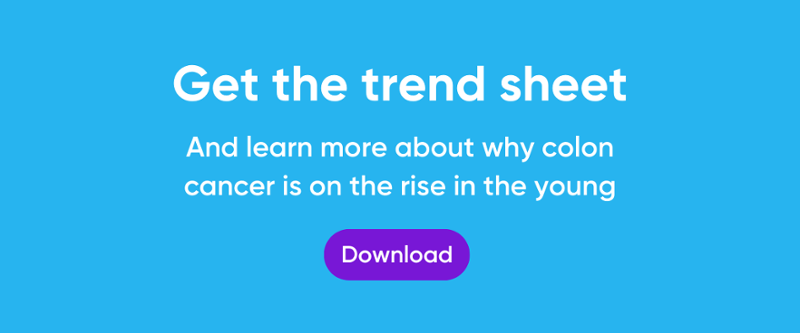About 106,970 cases of colon cancer will be diagnosed this year, and while overall colon cancer rates are decreasing, they continue to increase 1% to 2% each year in people younger than 50, and have been increasing in this younger population since the mid-1990s.1
As a result of the alarmingly increasing numbers of colon cancer in the young over the last five to 10 years, the American Cancer Society (ACS) amended its guidelines to recommend that those at average risk start getting screened at 45 vs. 50. As the numbers continue to climb, this recommendation may go even younger in the future.2
Why the premature surge?
Nobody fully knows why young people are increasingly getting diagnosed, but it‘s likely a combination of gene mutations that researchers don‘t yet know about and the environment. Scientists initially thought that diet may contribute to the higher number of incidences—specifically, one rich in red meat—but it turns out that diet is more likely to affect those around 60, 70, and 80 years old, since their younger counterparts haven‘t yet lived long enough for diet to have made that kind of impact.2
Other scientists have linked obesity to developing colon cancer. Race is also a factor—African American and Hispanic individuals are at a higher risk of getting it, and these individuals are typically diagnosed at later stages than white individuals.3 However, these risk factors also don‘t explain why younger people are developing the disease.
The younger the patient, the more likely the dismissal
One major cause that needs to be addressed is younger people don‘t go to the doctor when they experience symptoms of colon cancer; or when they do, they‘re dismissed due to their age. In fact, 75% of younger colorectal patients see two or more physicians and 36% see three or more physicians before getting a diagnosis.4 Further, colon cancer tends to be more aggressive in young people. It can take tumors five to 10 years to evolve in those 60 or 70, but that growth can happen in two to three years in younger people.2
→ Get the trend sheet: Why colon cancer is on the rise in the young [Download Now]
The vital importance of screening without delay
Early detection is key to survival, especially in the young. They should see a doctor if they experience:
-
Vague abdominal pain that persists for more than three months
-
Painless rectal bleeding or blood in the stool
As the cancer advances, they may encounter:
-
Severe abdominal pain
-
Increasingly smaller stool
-
Unintentional weight loss of 10 pounds or more
It‘s crucial that patients don‘t ignore these symptoms, even if they know they have hemorrhoids. Considering that effective, well-tolerated screening is available for colon cancer, unlike most other cancers, it can only help in determining for sure if they have cancer.2
The path from screening to survival
Surgery has come a long way in treating colorectal cancer. Chemotherapy has also evolved significantly, helping people with metastatic cancer live for many years—when 30 years ago, the treatment could usually only help them live for maybe six months. Further, genomic sequencing is innovatively helping determine the optimal treatment for each patient.
The trend toward higher rates of colon cancer in younger populations is troubling, but it should motivate younger people to get screened earlier—since with early detection, colon cancer is very treatable.2
Last updated March 7, 2023.
Originally published March 1, 2021.
References
1 Key statistics for colorectal cancer. American Cancer Society Web site. https://www.cancer.org/cancer/colon-rectal-cancer/about/key-statistics.html. Updated January 13, 2023. Accessed March 7, 2023.
2 Bonar S. Factors driving the rise of colon cancer in the young. City of Hope Breakthrough Blog. https://www.cityofhope.org/breakthroughs/factors-driving-the-rise-of-colon-cancer-in-the-young. Published August 31, 2020. Accessed January 14, 2021.
3 American Association for Cancer Research. AACR Cancer Disparities Progress Report 2020. https://cancerprogressreport.aacr.org/wp-content/uploads/sites/2/2020/09/AACR_CDPR_2020.pdf. Published 2020. Accessed October 6, 2020.
4 Potts M. Alliances releases never too young survey report [news release]. Washington, DC: Colorectal Cancer Alliance; June 4, 2020. https://www.ccalliance.org/news/press-releases/colorectal-cancer-alliance-releases-never-too-young-survey-report. Accessed November 11, 2020.
